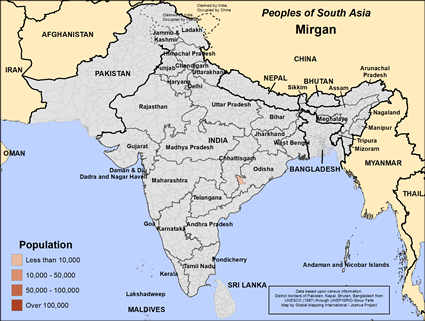The Mirgan people, a small ethnic group in India, primarily reside in Odisha. Historically, the Mirgan are known for their skills in weaving and textile production, particularly in the traditional handloom industry. Their community has long been associated with creating fine fabrics, and they have passed down their craftsmanship skills through generations. Over time, modernization and economic shifts have impacted their traditional livelihoods, yet the Mirgan people continue to maintain their distinct identity within the broader social landscape of Odisha. They speak Odia, the language of this eastern state.
While some Mirgan families continue to practice their ancestral craft, the rise of mechanized weaving and the decline of demand for handmade goods have forced many to seek alternative employment. Agriculture now plays a significant role in their livelihood, with families cultivating crops such as rice, pulses and vegetables. Some have also found work in small-scale industries or as daily wage laborers in nearby towns.
Mirgan villages are typically small and close-knit, with strong family ties guiding much of daily life. Homes are often simple, constructed from local materials like mud, brick and thatch. Life in the village revolves around seasonal agricultural activities and local festivals, with an emphasis on communal work and social gatherings. Economic hardships have led some Mirgan families to migrate to urban areas, but many remain rooted in their rural communities, maintaining a balance between tradition and change.
The Mirgan people primarily practice Hinduism, with a strong devotion to gods and goddesses such as Vishnu, Lakshmi and Shiva. Temples play a central role in their spiritual life, and religious festivals like Diwali and Pongal are important communal events. They observe rituals tied to the agricultural calendar, seeking blessings for good harvests and the well-being of their families.
In addition to mainstream Hindu practices, the Mirgan often incorporate local deities and village spirits into their worship. Ancestor veneration is also a key aspect of their religious life; they make offerings to ensure the continued protection and favor of their forebears. Though some have adopted more modern or urban forms of Hindu worship, traditional practices remain significant, particularly in rural areas.
The Mirgan people face several challenges, particularly related to economic stability and access to education and healthcare. With the decline of traditional weaving, many families struggle to find sustainable livelihoods, and the shift to agriculture has not always provided the same level of income. The lack of modern irrigation and farming tools further hampers their agricultural productivity.
Education opportunities are limited, particularly in rural areas, and many Mirgan children are unable to pursue higher education due to economic constraints. Healthcare services are also inadequate, with many villages lacking proper medical facilities, leaving the community vulnerable to disease and poor living conditions.
Development programs aimed at improving access to education, healthcare and alternative economic opportunities would greatly benefit the Mirgan people. Initiatives that promote sustainable agriculture, vocational training and support for the traditional handloom industry could provide a pathway toward economic empowerment.
Pray for Mirgan culture to be renewed and enhanced by a work of the Holy Spirit into a God-centered and God-honoring mold.
Pray for the Holy Spirit to move among Mirgan family and community leaders to seek his face and enjoy his blessings.
Pray for the Lord to thrust out workers who will be compelled to nurture a movement to Christ among the Mirgan people.
Pray that soon the Mirgan people will have faith that will lead them to live honorable lives that will draw others to the savior.
Scripture Prayers for the Mirgan in India.
Ethnologue: Languages of the World
Reports from Indian NGOs on rural and weaver communities
Academic research on traditional handloom industries in India
| Profile Source: Joshua Project |











